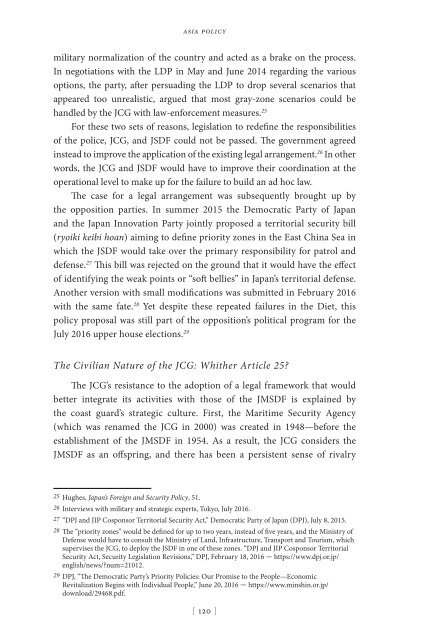2jBVKVf
2jBVKVf
2jBVKVf
Create successful ePaper yourself
Turn your PDF publications into a flip-book with our unique Google optimized e-Paper software.
asia policy<br />
military normalization of the country and acted as a brake on the process.<br />
In negotiations with the LDP in May and June 2014 regarding the various<br />
options, the party, after persuading the LDP to drop several scenarios that<br />
appeared too unrealistic, argued that most gray-zone scenarios could be<br />
handled by the JCG with law-enforcement measures. 25<br />
For these two sets of reasons, legislation to redefine the responsibilities<br />
of the police, JCG, and JSDF could not be passed. The government agreed<br />
instead to improve the application of the existing legal arrangement. 26 In other<br />
words, the JCG and JSDF would have to improve their coordination at the<br />
operational level to make up for the failure to build an ad hoc law.<br />
The case for a legal arrangement was subsequently brought up by<br />
the opposition parties. In summer 2015 the Democratic Party of Japan<br />
and the Japan Innovation Party jointly proposed a territorial security bill<br />
(ryoiki keibi hoan) aiming to define priority zones in the East China Sea in<br />
which the JSDF would take over the primary responsibility for patrol and<br />
defense. 27 This bill was rejected on the ground that it would have the effect<br />
of identifying the weak points or “soft bellies” in Japan’s territorial defense.<br />
Another version with small modifications was submitted in February 2016<br />
with the same fate. 28 Yet despite these repeated failures in the Diet, this<br />
policy proposal was still part of the opposition’s political program for the<br />
July 2016 upper house elections. 29<br />
The Civilian Nature of the JCG: Whither Article 25?<br />
The JCG’s resistance to the adoption of a legal framework that would<br />
better integrate its activities with those of the JMSDF is explained by<br />
the coast guard’s strategic culture. First, the Maritime Security Agency<br />
(which was renamed the JCG in 2000) was created in 1948—before the<br />
establishment of the JMSDF in 1954. As a result, the JCG considers the<br />
JMSDF as an offspring, and there has been a persistent sense of rivalry<br />
25 Hughes, Japan’s Foreign and Security Policy, 51.<br />
26 Interviews with military and strategic experts, Tokyo, July 2016.<br />
27 “DPJ and JIP Cosponsor Territorial Security Act,” Democratic Party of Japan (DPJ), July 8, 2015.<br />
28 The “priority zones” would be defined for up to two years, instead of five years, and the Ministry of<br />
Defense would have to consult the Ministry of Land, Infrastructure, Transport and Tourism, which<br />
supervises the JCG, to deploy the JSDF in one of these zones. “DPJ and JIP Cosponsor Territorial<br />
Security Act, Security Legislation Revisions,” DPJ, February 18, 2016 u https://www.dpj.or.jp/<br />
english/news/?num=21012.<br />
29 DPJ, “The Democratic Party’s Priority Policies: Our Promise to the People—Economic<br />
Revitalization Begins with Individual People,” June 20, 2016 u https://www.minshin.or.jp/<br />
download/29468.pdf.<br />
[ 120 ]


